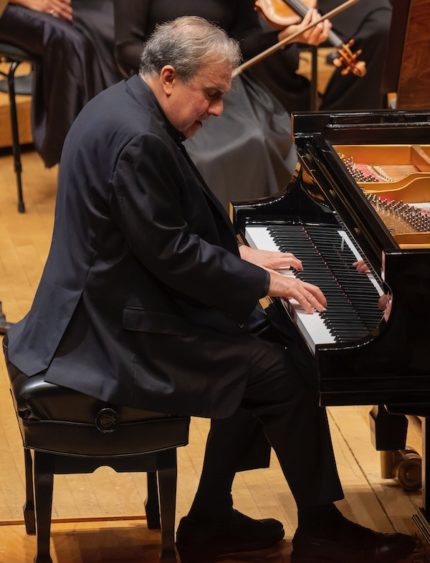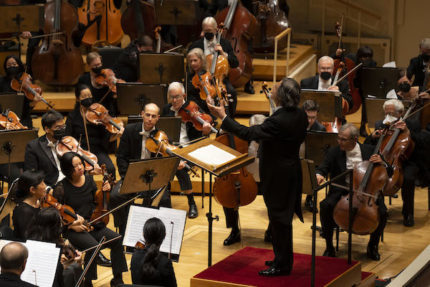Bronfman opens CSO season with powerful and dramatic Brahms

For the opening concert of Riccardo Muti’s final season as music director of the Chicago Symphony Orchestra, there was a refreshing lack of hoopla, speeches and distractions Thursday night. Clearly in good humor, the 81-year-old Italian maestro came out, led the National Anthem and got down to business.
Keen-eyed audience members will have noticed two new faces in the orchestra’s string sections. Last month, the CSO announced the hiring of bass Daniel Carson and violist Beatrice Chen. The latter musician is the daughter of CSO concertmaster Robert Chen (who is off this week).
The spotlight is normally fixed on the orchestra’s mercurial music director at these season-opening programs, and Muti directed with his usual attentiveness and spirited podium demeanor. But it was the no-nonsense Yefim Bronfman who delivered the highlight of the evening as soloist in Brahms’ Piano Concerto No. 1.
Though less often played in recent decades than the composer’s lighter B-flat major concerto, the First Piano Concerto is the greater work. Brahms struggled with finding the right form for this, his first orchestral work, casting it first as a sonata for two pianos, then a symphony, and finally the Op. 15 concerto we know today.
There is a cottage industry that attempts to interpret the young Brahms’ works in light of his close friendship with Robert and Clara Schumann, the latter especially. It may well be that aspects of Robert’s descent into madness and early death are reflected in the concerto, along with Brahms’ feelings for Clara that were more than friendship.
But we’ll never know definitively and searching for such Hallmark Channel silliness is a fools’ errand—as useless and futile as looking for anti-Stalin cryptographs in every bar of Shostakovich’s symphonies.
Premiered in 1858 with the 25-year-old composer as soloist, the 50-minute, D-minor concerto is a magnificent work and something of an outlier in Brahms’ music. There is a fury and intensity in the vast opening movement that is found nowhere else in the composer’s oeuvre, balanced by an uncommonly tender sensibility. In the Adagio time seems to stand still, as the solo piano ruminates in a searching introspection in which we almost seem to be eavesdropping on Brahms’ private thoughts. The clouds never quite lift entirely in an energetic finale that seems to close the work, not with joy, but with grim defiance.
Bronfman remains one of our finest Brahms pianists. He brought daunting power and virtuosity to this epic score, always secure in the restless turbulence of the solo writing, and audible over the orchestra. The soloist also encompassed the inward pages with worthy sensitivity, plumbing its rich vein of feeling without sentimentality and undue lingering. In the finale, Bronfman’s playing was aptly spirted yet unbowed, putting across the sense of cumulative release and determination.
Muti’s simpatico accompaniment was on the same level as his soloist. The conductor drew playing of volatile intensity in the stormy introduction, acute dynamic sensitivity in the slow movement and comparable assertiveness in the finale. One horn fluff apart in the final movement, the orchestra playing excelled across all sections.
There were well-deserved ovations and multiple curtain calls for soloist and conductor. Bronfman tried to include Muti in his calls, while the conductor urged the pianist to take solo bows in an amusing bit of Alphonse-Gaston.

The concerto was preceded by the U.S. premiere of Samuel Coleridge-Taylor’s Solemn Prelude, part of the CSO’s ongoing series of spotlighting (usually short) works by black composers.
Solemn Prelude was premiered at the 1899 Three Choirs Festival in the British composer’s native England in 1899. Lost for decades, the score was recently rediscovered in the British Library and revived at the same festival last year.
If “masterful” as the program note described it, is a tad overstated, the Solemn Prelude is an attractive work, cast in Coleridge-Taylor’s engaging lyrical vein, rising to a suitable if predictable brassy climax. Muti gave it unapologetically sumptuous treatment, leading a ripe, operatic performance.
Still, even at just nine minutes, this Late Romantic idyll feels long for its material and overblown in its symphonic guise. An artful transcription for strings or chamber ensemble would likely make a more convincing, aptly scaled case for the piece.
Muti has been a consistent advocate for Tchaikovsky’s early symphonies in his Chicago tenure, and the evening closed with the composer’s Second Symphony.
There was nothing diminutive about this “Little Russian” performance. Muti led a characteristically incisive, high-beam reading with fiery, at times metallic tuttis.
Tchaikovsky’s subtitle for Op. 17 is the former, rather condescending, name for Ukraine in Czarist days, reflecting the composer’s mining of Ukrainian melodies in this work. It felt almost as if there was a contemporary subtext in Thursday’s performance to the current tragic situation in Ukraine, with Muti whipping up the volume and intensity to a violent, near-cacophony at times in the outer movements. That made for ample excitement in the buildup of the insistent theme of the finale—taken at a more stately tempo than usual—with Muti eventually accelerating to a cataclysmic coda.
Yet overall this was a hard-driven and relentless performance, short on charm and heavy on volume. The middle movements came off best, with David Cooper’s atmospheric horn solos helping to leaven the bombast.
The program will be repeated 1:30 p.m. Friday and 7:30 p.m Tuesday. Yefim Bronfman will perform Mozart’s Piano Concerto No. 22 at the “Symphony Ball” gala, 6:30 p.m. Saturday. cso.org.
Posted in Uncategorized


